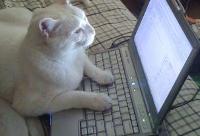Many variables create the lay and lie conundrum. Not only are they irregular verbs, but other issues arise when dealing with these two words and their various forms:
The past tense of one form is the present tense of another, i.e., the past tense of lie is lay.
Lay is also a present tense verb.
One of them, lie, can also refer to an untruth.
Lay means to put down, or to place.
It is a transitive verb and requires an object.
Lie means to recline, or occupy a location.
It is an intransitive verb and does not have an object.
Tip from CCP: A good way to remember which has an object and which doesn't is LIE. When using it to reference an untruth it has a negative connotation, so think of the fact that it does NOT have an object.
Therefore, you LAY a book on a table, and you LIE down.
(You don't lie the book on the table - you have an object. And, in the present tense, you don't lay down - you don't have an object).
Confused yet?
Here are some examples on how to conjugate these two verbs:
LAY
Remember lay is transitive and must have a direct object.
The past tense of lay is laid.
- Present tense: I lay the books on the table.
- Past tense: I laid the books on the table.
- Past participle: I had laid the books on the table.
LIE
Remember lie is intransitive and cannot have a direct object.
The past tense of lie is lay.
- Present tense: I lie down to rest.
- Past tense: Yesterday, I lay down to rest.
- Past participle: One day last week I had lain down to rest.
*****************************************************************
Substituting lay with place:
Since lay means to put down or to place, a good test in deciding whether to use lay or lie in a sentence is to *substitute the word place, placed or placing (as appropriate) for the word in question. If the substitute fits, the corresponding form of lay is correct. If it doesn't, use the appropriate form of lie.
- I will (lie or lay?) down now. (You would not say "I will place down now." Therefore, "I will lie down now" is correct.)
- I (laid or lay?) the pad on the desk. ("I placed the pad on the desk" works. Therefore, "I laid the pad" is correct.)
- I (laid or lay?) awake many nights. ("I placed awake" doesn't work. "I lay awake" is correct.)
- These files have (laid or lain?) untouched for some time. ("These files have placed untouched" doesn't work. Correct: "These files have lain untouched.")
- He has been (laying or lying?) down on the job. ("He has been placing down on the job" doesn't work. Correct: "He has been lying down.")*
*Source: The Gregg Reference Manual, Sixth Edition*
***************************************************************
Even grammar "experts" have a difficult time with lay and lie, and use a cheat sheet such as the one below:
****************************************************************
PRESENT........PAST..........PAST
TENSE...........TENSE........PARTICIPLE
Lay*................Laid............Laid______to place or put down
Lie..................Lay..............Lain______to recline
*Remember - requires an object.
****************************************************************
(Special Note: "Layed" is not a word - it is "LAID.")
Today you lay the book on the table,
yesterday you laid the book on the table,
and in the past you have laid the book on the table.
You need to lie down today,
yesterday you lay down
and in the past you have lain down.
If you had printed this out, you could now lay the pages on the table and go lie down and relax after reading all this information about lay and lie.
If all else fails, at least the chart above will help you remember. Really! I wouldn't lie!
Showing posts with label Lay and Lie. Show all posts
Showing posts with label Lay and Lie. Show all posts
Sunday, August 30, 2009
Subscribe to:
Posts (Atom)
































































